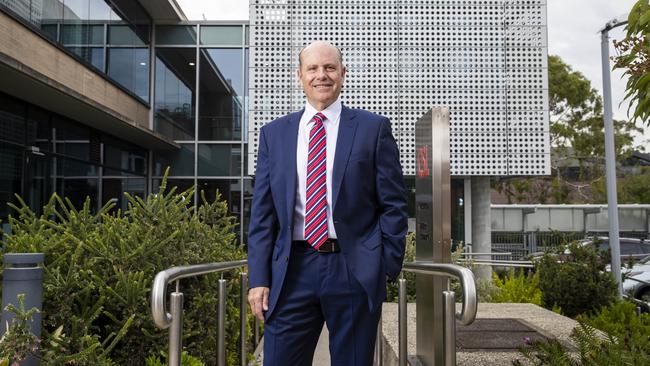Morrison blindsided CSL on becoming health minister as company produced more than 50m Covid-19 jabs
The pharmaceutical company says it had no idea it had to deal with two health ministers when it was tasked with producing the majority of Australia’s Covid-19 vaccine supply.
Business
Don't miss out on the headlines from Business. Followed categories will be added to My News.
Scott Morrison did not tell CSL that he appointed himself health minister, despite the country’s largest pharmaceutical business playing a key role in his government’s Covid-19 response, including the production of more than 50 million vaccine doses.
While former health minister Greg Hunt knew the ex-prime minister had been also sworn in to the portfolio, CSL chief executive Paul Perreault remained in the dark until this week.
The appointments came as CSL was tasked with producing the majority of the nation’s Covid-19 vaccination supply and was in talks with the government about building an mRNA vaccine production plant.
“I had no idea because it was a secret, supposedly,” Mr Perreault said on Wednesday.
Mr Perreault was speaking after CSL posted a five per cent fall in profit to $US2.25bn ($3.2bn) in the 12 months to June 30 from $US2.38bn last year.
When asked whether Mr Morrison being joint health minister affected the contract over the mRNA factory, ultimately awarded to Moderna, Mr Perreault said: “I don’t know whether it affected us or not.”
Mr Morrison insists he made only one decision as a portfolio minister – to cancel an oil and gas exploration permit off the NSW coast, go assist the election prospects of local Liberal MPs. This was not a cabinet decision; it was a decision for the resources minister, Keith Pitt, who had a different view to Mr Morrison.
CSL planned to build a dedicated mRNA factory in Melbourne, but CSL chairman Brian McNamee said in December the government had advised that “it will not advance the company’s proposal to construct an onshore mRNA vaccine development and manufacturing facility” after Moderna won the contract.
Mr Perreault in the last fortnight, has been negotiating with the Albanese government about having the company’s cell-based flu vaccine funded under the National Immunisation Program.

Flucelvax Quad – which costs $40 a shot, about double the price of a conventional flu shot – has been dubbed CSL’s “super flu jab”, given it more closely matches the strains of the virus identified by the World Health Organisation.
“With the new administration now in, we have another opportunity to really sit down and have some good chats and I have already since I‘ve been in Melbourne, I’ve spoken with a number of people from government on this particular topic,” Mr Perreault said. “It’s complex … but the data is real, and the data is there and I believe that once we sit down and look at the data, hopefully, Australia will step up and fund the program.”
Governments in North America and Europe already fund Fluxelvax Quad. CSL has done modelling which shows that administering the vaccine can help reduce hospitalisations and therefore government health budgets.
Mr Perreault believes that Australians remain under vaccinated for influenza, with many not taking the virus serious despite about an annual 650,000 flu-related deaths globally.
Demand for seasonal influenza vaccines pushed US sales across CSL’s Seqirus division above $US1bn for the first time. Overall, CSL’s revenue firmed 2 per cent to $US10.14bn in the year to June 30.
Mr Perreault said: “CSL has delivered a good result at the top end of our guidance, demonstrating our resilient performance against the ongoing challenges presented by the global Covid pandemic”. The pandemic has hindered its ability to collect plasma donations for its lifesaving products, “constraining sales”.
“As the year progressed, we grew plasma collections significantly, albeit at a higher cost. Collections were up 24 per cent which we expect will underpin strong sales growth in our core plasma products, Ig and albumin, going forward,” Mr Perreault said.
“The pandemic has put us two years behind projected growth in plasma collections – which is suboptimal for patient care.”
CSL’s haemophilia B treatment, Idelvion, increased sales by 20 per cent, while Kcentra, its peri-operative bleeding product, grew 18 per cent as hospital demand returned to pre-pandemic levels. The results come as CSL finalises its $16.4bn takeover of Swiss renal treatments company Vifor Pharma, which is estimated to be 8 per cent earnings per share-accretive in 2023.
Investment bank Morgan Stanley expects the deal to push CSL’s share price to $400 by 2025.
Excluding the Vifor acquisition, CSL’s net profit is expected to return to growth next year, with the company forecasting $2.4-2.5bn at constant currency.
CSL shares closed down 3.4 per cent, or $9.93, at $286.46.
More Coverage
Originally published as Morrison blindsided CSL on becoming health minister as company produced more than 50m Covid-19 jabs





